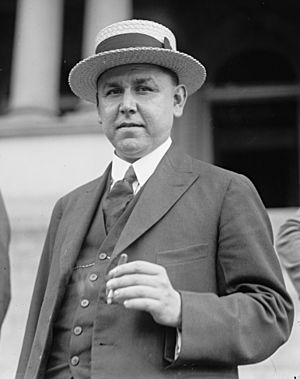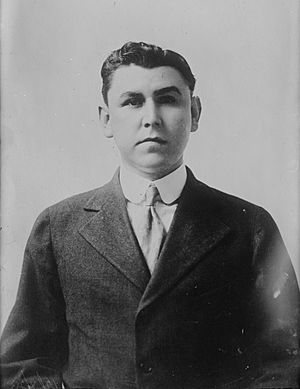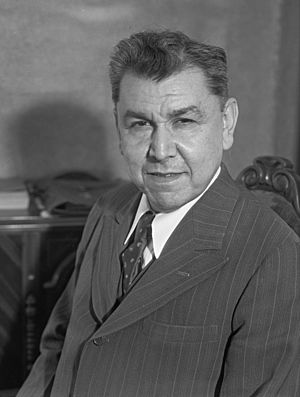Adolfo de la Huerta facts for kids
Quick facts for kids
Adolfo de la Huerta
|
|
|---|---|

De la Huerta in 1922
|
|
| 45th President of Mexico | |
| In office 1 June 1920 – 30 November 1920 |
|
| Preceded by | Venustiano Carranza |
| Succeeded by | Álvaro Obregón |
| 35th Treasurer of the Republic | |
| In office 1 December 1920 – 25 September 1923 |
|
| Preceded by | Salvador Alvarado |
| Succeeded by | Alberto J. Pani |
| 3rd Governor of Sonora | |
| In office 1919–1923 |
|
| Preceded by | Plutarco Elías Calles |
| Succeeded by | Alejo Bay |
| Personal details | |
| Born |
Felipe Adolfo de la Huerta Marcor
26 May 1881 Guaymas, Mexico |
| Died | 9 July 1955 (aged 74) Mexico City, Mexico |
| Political party | Liberal Constitutionalist Party |
| Other political affiliations |
National Cooperativist Party |
| Spouse | Clara Oriol de la Huerta |
Felipe Adolfo de la Huerta Marcor (born May 26, 1881 – died July 9, 1955) was an important Mexican politician. He served as the 45th President of Mexico for a short time, from June 1 to November 30, 1920. He became president after the previous leader, Venustiano Carranza, was overthrown. This happened with the help of two other important generals from Sonora, Álvaro Obregón and Plutarco Elías Calles, as part of the Plan of Agua Prieta. Adolfo de la Huerta is remembered as a key figure among the Constitutionalists during the Mexican Revolution.
Contents
Adolfo de la Huerta's Early Life
Adolfo de la Huerta was born on May 26, 1881, in Guaymas, a city in the state of Sonora, Mexico. His family was well-known. He studied music in Hermosillo and even earned a certificate. However, to support his family, he became a bookkeeper instead of a musician.
In 1908, he joined a group that was against leaders staying in power for too long. By 1910, he became the secretary of this group. This decision cost him his job with the government. In 1911, he won a seat in the Sonora state legislature, defeating Plutarco Elías Calles.
Joining the Mexican Revolution
Both Adolfo de la Huerta and Plutarco Elías Calles joined the Constitutionalist movement in 1913. This happened after Victoriano Huerta took power from Francisco I. Madero. De la Huerta became a chief clerk for Venustiano Carranza from 1915 to 1916. This was when the Constitutionalist group gained control.
He then became the temporary governor of his home state of Sonora from 1917 to 1918. He also worked as Mexico's consul general in New York City in 1918. He even traveled to Washington, D.C., to discuss Mexico's neutral position during World War I.
De la Huerta was upset when he returned to Mexico. He learned that President Carranza had taken a lot of gold from Mexican banks. De la Huerta had previously told the U.S. government that such claims were false. He later served as a federal senator in 1918 and was governor of Sonora again from 1919 to 1920.
Conflict with President Carranza
President Carranza did not want Obregón to become the next president. Carranza then thought about De la Huerta, but it was said that De la Huerta was not interested in the job. Carranza then chose Ignacio Bonillas, who was a civilian and ambassador to the U.S.
De la Huerta and Carranza had disagreements over Sonora. Carranza tried to take control of the Sonora River, but De la Huerta insisted it belonged to the state. De la Huerta also disagreed with Carranza's interference in a peace agreement with the Yaqui people. This agreement had helped end fighting, and Carranza's actions threatened to restart it.
Carranza further angered De la Huerta by appointing Manuel Diéguez as the military head in Sonora. He tried to send federal troops through the United States to Sonora. De la Huerta responded by making Calles the head of military operations in Sonora. Carranza then tried to remove De la Huerta as governor. Calles began to support De la Huerta against Carranza. He sent a telegram saying he no longer recognized Carranza's government.
Becoming Interim President
The three Sonoran generals, De la Huerta, Obregón, and Calles, created the Plan of Agua Prieta. This plan led to a revolution. De la Huerta, Calles, and Salvador Alvarado were mostly in charge of writing it.
After this, the Mexican Congress chose De la Huerta to be the temporary president. As interim president, De la Huerta worked to bring peace to the country. He encouraged Mexicans who had left the country to come back home. He also forgave people who had supported Carranza.
One of his biggest achievements was negotiating with Pancho Villa and his army. De la Huerta knew Villa personally. They reached an agreement where Villa surrendered and was given a large ranch. Obregón strongly disagreed with this deal. Despite Obregón's objections, Villa and De la Huerta made the agreement. Villa lived on the Canutillo ranch until he was assassinated in 1923.
When Álvaro Obregón won the 1920 presidential election, De la Huerta stepped down. He then became the head of the Secretariat of Finance and Public Credit. In this role, he helped negotiate an important financial agreement called the De la Huerta–Lamont Treaty.
The De la Huerta Rebellion
In 1923, De la Huerta started a rebellion against President Obregón. Obregón was also from Sonora. De la Huerta said Obregón was corrupt. This happened after Obregón supported Plutarco Elías Calles to be his successor.
Many groups supported De la Huerta, including some religious people, conservatives, and a large part of the army. The United States government, farmers, and workers supported Obregón. Obregón also created a modern Mexican Air Force. With this support, Obregón was able to stop the rebellion. De la Huerta had to leave Mexico.
On March 7, 1924, De la Huerta went to Los Angeles. Obregón ordered that any rebel officer with a high rank be executed.
Later Life and Legacy
President Lázaro Cárdenas invited De la Huerta to return to Mexico in 1935. Cárdenas made him an inspector for Mexican consulates in the U.S. He worked in this role until he retired in 1946. Adolfo de la Huerta died on July 9, 1955, in Mexico City.
See also
 In Spanish: Adolfo de la Huerta para niños
In Spanish: Adolfo de la Huerta para niños
 | Janet Taylor Pickett |
 | Synthia Saint James |
 | Howardena Pindell |
 | Faith Ringgold |



